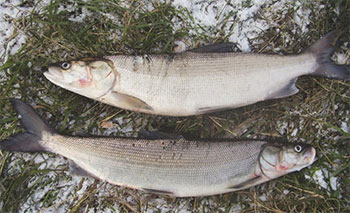|

Nelma, Stenodus nelma. (Photo: res.krasu.ru)
Russian whitefish could replace Norwegian salmon
 FINLAND
FINLAND
Friday, September 30, 2016, 01:40 (GMT + 9)
The Natural Resources Institute of Finland (Luke) estimates that the nelma or sheefish (Stenodus nelma), native but endangered in Russia's Arctic northern rivers, could replace Norwegian salmon imports.
Researchers from the institute explain that the nelma, a silver-coloured and migratory predatory fish, is well suited to being farmed even when it matures late and grows slowly, YLE News reported.
In Laukaa they have been farmed using whitefish breeding techniques, and now the first generation of brood fish is splashing away in the facility's pools.
In the wild, the nelma can grow to 1.5 metres in length and more than 20 kg, though the median weight for the creature is around 9 kilos.
The first nelma spawn was brought through quarantine from Russia to the Laukaa fishery some six years ago.
In these scientists’ view, it will be a couple of years until a packet of nelma can be bought at a local shop. It is perfect as a salted fish which works both cold and hot-smoked, and would not be out of place on the menu of a gourmet restaurant.
However, some experts in the field have pinpointed certain disadvantages, such as its slow growth rate that makes it expensive to farm.
Secondly, Finnish law makes it impossible to plant nelma in natural water areas and years of research will be necessary to prove that the species does not harm or interfere with any others.
"In Russia the nelma has become more rare in nature, and is actually endangered," pointed out Risto Kannel from Luke. "They tried to farm it there because it's a preferred dish. We want Finns to take it on board as well."
The Natural Resources Institute is focusing on maintaining the genetic stock of the nelma and taking care of the brood. The Institute's job is to deliver nelma spawn to independent fish farms, of which there are some 200 in Finland.
"The private sector may see the nelma as an opportunity. Of course it's a risk because the pools are reserved for different species, but it's also a possibility," Kannel stressed.
Scientists recall that in the 1960s, Norway pioneered salmon aquaculture, which spread quickly to Scotland, Ireland, Iceland, the Faeroe Islands, Canada, the US, Russia and Denmark.
Today, Norway remains Europe's largest supplier of farmed fish.
editorial@seafood.media
www.seafood.media
|



